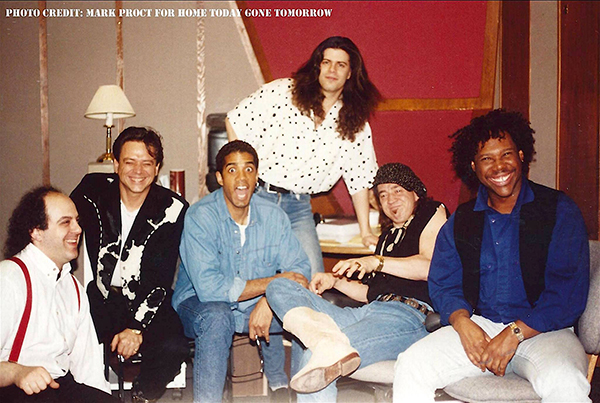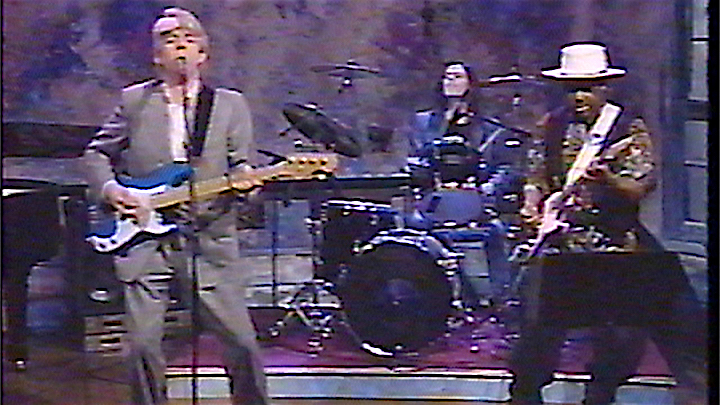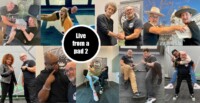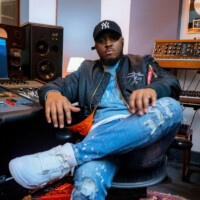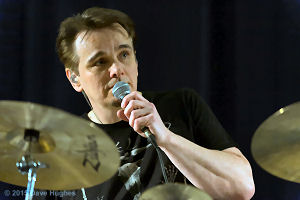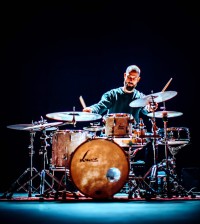Born to a musician mother, Larry Aberman was always surrounded by music but struggled to find an instrument he was passionate about. It wasn’t until his brothers band left a drum kit in the house that he discovered the sticks for himself at the age of ten.
The upbringing in this musical household, the environment in Center City Philadelphia, and the move to New York a few years later greatly influenced Larry’s taste in music and help shape him into the versatile and well-rounded drummer he is today.
Thanks to this, Aberman has played with hundreds of artists from pretty much every possible genre: Wynton Marsalis, The Vaughan Brothers (Stevie Ray and Jimmy Vaughan), Lionel Ritchie, Nile Rodgers, Marcus Miller, Joe Sample, Ben Harper, David Lee Roth and Foreigner are just a few names on his CV.
Over a decade now Aberman has been in the chair for Cirque du Soleils Las Vegas show ‘Zumanity’ with no end in sight.
I caught up with Larry via Skype to chat about his upbringing, his work for Cirque du Soleil and the versatility that keeps his career fresh and exciting.
You’ve got more of a jazz and percussion background, right?
I guess so. You know, my background has just been varied the whole time. When I was in high school I think I was focused more on jazz and classical music when lots of my friends were playing in clubs. I’ve always been listening to a lot of pop, rock, R’n’B and funk. I grew up in Center City, Philadelphia before I moved to New York and the streets were just alive with that. Everybody had a Boombox and there was this station, WDAS, that everybody had their box set to. One guy would walk down the road playing Jackson 5 and while he fades away, another guy is coming the other direction with the same tune. The streets just had that vibe to it. And then the whole Philly sound too, it was pretty deep in my bones. I’ve always really been interested in being well rounded and listening to all music, that’s just my nature.
In high school I played a lot of classical music, timpani and percussion like that and I really enjoyed it. There is nothing like being inside an orchestra, not watching one. At college I decided I wanted to play more orchestral music and play music from composers like Mahler and Stravinsky at a very high level. A lot of my teachers went to the Eastman School of Music in Rochester, NY, so I decided to go there too. Eastman is a pretty well-known classical school that has a great top jazz program too.
I played a lot of percussion and jazz drum set there but after graduating I decided I wanted to be a pop star like a lot of my friends back home in NY were becoming [laughs]. I wanted to go out on tour busses, get free drums and cymbals… I made a conscious decision that I wanted to be a drummer in a band, so I kind of shifted gears heavily. I didn’t play jazz or classical music for probably 20 years.
You did a lot of touring with Joe Sample though. So when did you get back into playing jazz?
Probably about five years before starting the Cirque gig. I was playing with a pop artist, Joe Samples manager was in the audience and asked me if I would be interested in playing with Joe. At the time it was only a trio with Lalah Hathaway. That awoke a lot of the jazz stuff.
At Cirque, my show is so electric and hard-hitting that when I have downtime, I want to hear some acoustic instruments – so I started getting back into it.
You’ve played all kind of gigs from jazz, rock, musical theatre. Has diversity always been important for you?
Yes, I think that’s just how it stays interesting for me. I guess because I grew up in Philadelphia and then New York when I went to high school, it was just that the best of the best of every genre were there. So I had inspiration everywhere and I just admired greatness in every area. That was what I aspired to and worked towards.
What prepared you best for working in all these genres?
I think for me it was how I grew up, especially in New York. The different genres are not so different or defined as in “ok, you’re that guy”. I had really long hair in the early 90s and was working with Nile Rodgers doing pop, funk and R’n’B projects. When I went out to LA at the same time it was a ‘long hair = rocker dude’ kind of thing. “Oh, you’re in a rock band”?! Errm, no I’m not – just in a rock band. New York is just a big mix. I played in groups that were all over the musical spectrum.
New York is where you also started doing lots of recording. How did you get into that side of things?
You meet people, you start playing and when I was young everybody started to record demos and we’d spend lot time in recording studios. People would hire me for many different reasons but there were so many recording studios and when I started off there were no drum machines.
I remember being on a session at a place called Unique Recording which used to buy all the new gear. They had synthesizers, an Emulator and they one of the first Linn Drums.
I was doing a day of recording with these Rastafarians but by the ninth tune of the day I had nothing left. I was a young guy, I didn’t know how to pace myself. The engineer pulled out a Linn Drum and just programmed it. I couldn’t believe it. It played the groove I was desperately trying to hold onto playing solidly over and over again. Wow!
Before that anything that was recorded needed musicians, there was no other alternative. That had a lot to with me recording a lot and gaining experience. So when more top producers needed somebody young, cheaper, and played exciting, reckless, drum fills, they started calling me. One producer I worked for used to use a certain guy but then said: Man, I just got tired of hearing the same fills.
You then moved to Los Angeles?
I was living in this loft in Brooklyn and doing the whole New York thing to death and I just started getting a lot of calls from L.A.. Finding myself flying out there a lot to work and getting to know the scene I decided to get a small apartment. After a couple of years I gave up the Brooklyn place because I wasn’t going to back to New York as much. It really didn’t matter anymore. My mother still had her place in NY so if I needed to go back, I always had a place to stay. So yeah, I somewhat remained bicoastal but I think the weather…. [laughs]. I spent a good eight or nine years in LA.
It was Los Angeles where you got into composing as well, right?
Yes that’s true. A friend of mine, Tal Bergman, is a drummer too and one day I went to his house (probably about 25 years ago) and he had a full set up in his living room: a drum set that was mic’d and plugged into a PC running ACID. When I saw that in action and how he was producing some dance music for commercials I was so impressed that I got a loan and went and bought a studio for 15 grand: Cubase, a Mac, speakers, mics, figured out how to record drums and that was it.
I then started recording a lot of music for people that were doing library music and started building up relationships with the guys composing the stuff. I had my studio and started writing my own stuff, just because that’s what you do when you’re surrounded by synths and drums. As drummers I think we create a very unique writing with a different feeling and sensibility. I sent one of the composers 12 of my electronica tunes and he went: these are great, we’re gonna use them. That was about 2000 and I was on the road a lot so I got myself a little MIDI keyboard. I took that, a little Midi box and my laptop on the road and I was composing for TV. Those compositions I did in 2000 are still on TV today and I still get paid for it. I remember working on one of them just sitting against a wall in an airport waiting for my flight…
Tell me about your work with the Stevie Ray Vaughan?
They put a band together called The Vaughan Brothers with Stevie and Jimmy. Nile Rodgers was producing the album. I worked on a bunch of stuff with him and he got me on the gig. We did the record and were gonna go on tour. It was such a huge thing for me, for everyone and for the brothers especially because of their level of yearning to get together and make a record. They were both in the right place to do something. The record came out really good, got great response, we were all very excited about taking it on the road and then a week before the first single was released the accident with Stevie happened. It was a devastating blow for everybody!
I was about 25/26 you know, it was like magic. We got to the studio in Memphis, get into the room and it was just so cool. They had these great drums there, I started setting them up, getting tones and I just wanted to start recording straight away. We went in the next day and recorded a song called ‘DF/W’ and that song won a Grammy – the first song we did together. For the next two weeks we recorded a song a day.
Stevie was just such a wonderful spirit and soul, so kind and he was in such a great place. He was incredibly inspiring to me and all of us. In many ways the legacy of his kindness and power effected us in so many profound ways which is a whole other interview. On top of all that he was an exceptional guitar player. Two or three solos on the album are actually the live solos he actually played when we cut it. That’s it, it’s perfection. Jimmy took me in like a brother when we were working on that. He’s such a sweet man. And at this point he’s a living legend.
Your current gig is the Cirque du Soleil show ‘Zumanity’.
Yeah, I got the call to audition just last minute. A friend of mine was working in a studio right next to where they were auditioning people and they asked him if he could recommend anybody who plays drums as they had a tough time finding a drummer. He gave them my number and they called that afternoon. I was sitting in my studio in L.A. and was pondering what my next move is because Joe had just moved on and went back to his old band The Crusaders. They asked me if I would be interested in auditioning and I never say no to any audition. I did actually when I was young; I used to pass on stuff mostly for fear.
Anyway, I asked them when they wanted me to audition and they went: “Now?”. So I took my stick bag, drove over there and played for them for an hour. They really auditioned everything about me because they wanted to see the whole spectrum. It went really well and they said they were gonna hire me, they just weren’t sure where. A few months later they called me with the offer for Zumanity, so I knew where I was going: Las Vegas. That was 13 ½ years ago.
Wow, that’s a long time.
It’s unbelievable. The saving grace is that the show changes a lot. We did a whole set change two years ago so it’s very different now. A lot heavier, a lot more contemporary, a lot more 808 and low-end-y. So yeah, it changes a lot and time flies. I call it Cirque time. The show and I think Vegas in particular moves so fast. When I was growing up they used to say in Vegas they would pump extra oxygen into the air in Casinos to keep people awake. It’s that amped atmosphere full of excitement. It’s always a “Oh, another year went by?!”. And I’m getting old, it’s scary. (laughs)
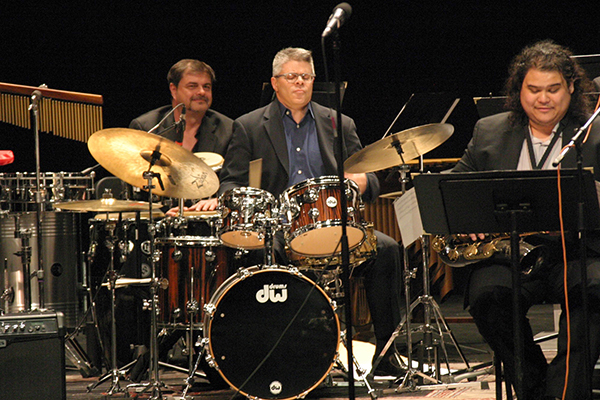
Is it a 8-shows-a-week kind of thing like in the West End here?
It’s ten. We have two days off but also two 2-show days. It’s a heavy weight schedule and a heavy weight show. That’s where technique comes into play. The other thing that I’m grateful for is all the training I had when it comes to that. It really enabled me to keep this gig and stay healthy. Taking care of my back, learning how to play relaxed and stuff like that has helped me to maintain and I feel pretty damn good; touch wood. That’s the struggle. I’ve actually had artistic directors come in and talk to me and they’re amazed because I don’t miss a lot of shows and don’t get injured.
You said the show moves a lot, so are there a lot of rehearsals too?
No, not at all. Part of the thing when they hire people they want people who can work fast. There are changes. If it’s big-time changes, the MD would send us a chart or an audio of the reworked arrangement but not a lot of huge things happen like that anymore.
I’ve done Broadway shows too and you just make sure you sit there ready when the conductor gets up there. If you can manage to slip in at ten to seven, nobody cares; the minute you mess up, it’s over. Cirque wants us there which also gives us a 20 minute slot at soundcheck to go over things.
Sometimes we do rehearse the show. If there is an act that needs the live band for what they call ‘show conditions,’ they’ll call us in earlier.
You mentioned the show is quite electronic-y right now. Are you on hybrid kit then, or is there a percussionist?
No. We have our bass player running Ableton Live so he’s running some loops and I play to a click from that. I run Ableton too and use it as a sample player that I control with a KAT controller. There are two numbers where I play half of the song on the electronic drums. One is a scene in a bathroom and the composer asked me what I would play on it. All I could think of was this Buddy Rich video where he’s running around playing all these different pipes and radiators, so I went and sampled things in the bathroom. I went to my apartment and hit the bathtub which I use as a bass drum; drop some tweezers on the counter which is the snare; opened the faucet as the hi hat and stuff like that. My favourite is the toilet seat closing.
The drum kit itself is just a normal 6-piece. Three toms, kick, snare, an array of cymbals and I use a roto tom with it. I’m there playing on top of loops and with loops. It’s a very active drum chair. A neat organic and electronic mix.
You’re also a Professor of Applied Drumset at the University of Las Vegas?
Yes, I actually went about four or five years ago and took a Masters in Jazz performance there to enable me to teach. It was two fold. I knew I wanted to teach more because I’ve been taught so much. When I did find myself in a situation where I was teaching or helping I had a lot of information, the problem I had was that I had absolutely no concept of how to be a teacher, which is an art itself. And then dealing with the younger kids. I mean so much has changed since I was at school. I thought if I’m actually gonna try and teach a curriculum, I need to see how it’s going. So going back to school was also an education for me as to what it’s like now. The best example for this is when I was at college they said: go to the listening library, they hand you an album, put it on the turntable, put the needle on the thing… it ain’t like that anymore. There was no email or Spotify.
Also to see how kids study and behave has really helped me to be a better teacher.
After that the timing was right, I started teaching at the University and I love it.
Finally, what’s next?
Cirque de Soleil are talking about another five years on the contract which would take me to 59 years old….which in itself just…. [laughs]. If I make it, I’ll play it out. I don’t know. It’s an unbelievable gig so I’ll play it as long as they’ll have me.
In terms of what’s next, I stay very active on what’s happening musically in technology. I need to take more time figuring out the interactive nature with Ableton Live. I don’t feel like anybody has really captured it as fully as it could be. I do get pissed off with the technology sometimes as I think electronic percussion triggering, etc. is still in dinosaur mode. But I keep up to date so when I talk to the kids I’m pretty hip. (laughs) One of my students I’m teaching him traditional jazz, Big Band and all that stuff but then we break off for 20 minutes and work on Logic because he also studies electronic music at school.
For me I just continue teaching, doing clinics and playing. The universe tells me what’s next, I don’t know. Like I said, I do love diversity. Doing this interview is as fun for me as tuning up an old Radio King!
Thanks a lot for your time Larry!
Interview by Tobias Miorin

